By Nancy Jaffer
April 6, 2017
It can be argued that the CP National Horse Show’s ASPCA Maclay is the most iconic of the hunt seat equitation championships held over 3-foot 6-inch fences.
Certainly, it’s the oldest. A long run at Madison Square Garden before it started moving around the country still burnishes mention of the class that began in 1933, even though it left that arena for good after 2001.
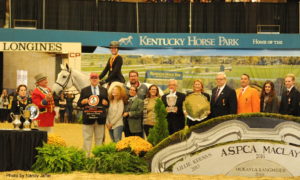
Hunter Holloway was the winner in 2016 when there was only one Maclay class at the National Horse Show. (Photo by Nancy Jaffer)
The USEF (formerly AHSA) Medal established in 1937 also is prestigious, but now there’s a Medal this, and a Medal that at a variety of locations. Let’s face it, the word “medal” is pretty generic. But until this week, the Maclay was still the Maclay, and one of a kind.
Then came the announcement that the 2017 National will host a new class, the 3-3 Maclay, with 3-foot, 3-inch fences on the Sunday before the show officially gets under way in the Alltech Arena at the Kentucky Horse Park.
There are plenty of reasons for having a 3-3 alternative to the 3-6 test for riders who want to show at the National, but aren’t quite up to the rigors of the historic class. We’ve all seen kids who have spent the entire season trying to qualify, only to reach the finals and realize they weren’t ready for the test when they hit the ground or suffer through embarrassing refusals without getting around the course.
However, sharing a name between the two classes is not only confusing, in the view of many, it’s disrespectful. And isn’t it diluting the brand? Maclay winners I talked with were stunned and perturbed that the new class will have the same name as the competition toward which they worked for years, and which was the major accomplishment of their teens—often setting the stage for success in international show jumping or some other professional equestrian career.
“Do not call it the Maclay,” Leslie Burr Howard, the 1972 winner of the class, said about the 3-3 version.
“It’s not the Maclay.”
Noted George Morris (1952), the leading authority on hunter seat equitation (he wrote the book by that name) when he was base at Hunterdon in Pittstown: “I certainly wish they would name it something different, but I can understand that you don’t want to do that, because every person who goes in the 3-3 competition wants to tell everybody he rode in his level of the Maclay. If they called it something else, I’ll bet they wouldn’t have the interest that they would have if they called it the Maclay. It’s very sad.”
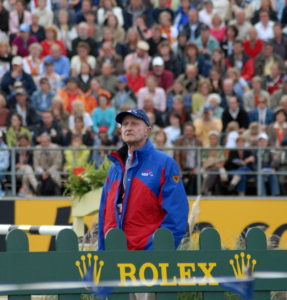
George Morris (Photo by Nancy Jaffer)
Mary Mairs Chapot of Neshanic Station, who won the class in 1960, observed, “It just seems like it takes away from the real thing.
“It seems like they could have given it another name,” added Mary, whose sister, Wendy Mairs (1963), and husband, Frank Chapot (1947), also have their names engraved on the Maclay trophy.
“My initial reaction was a little shock,” said trainer Stacia Klein Madden (1987) of Beacon Hill in Colts Neck. “I got a few email responses, what is this? Did you endorse this? I wish we’d all had a chance to weigh in on this.” She said she was, however, asked to weigh in on the specifications for the class “and I think one of my comments as I weigh in on the specs is that I will weigh in on the name as well.”
Asked about the duplication, CP National Horse Show President Mason Phelps said of the 3-3 class, “If you read the name very carefully, the word ASPCA is not there.”
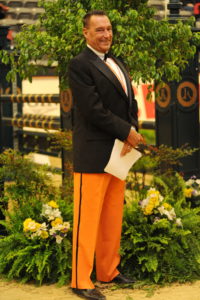
CP National Horse Show President Mason Phelps. (Photo by Nancy Jaffer)
When I asked if the name of the 3-3 class could be changed, he responded, “It was a board decision that was discussed for a couple of months, it was batted around a lot and that’s where we ended up. We think it has a lot more punch using the word Maclay in there, versus not. We want to keep it all sort of in the spirit of what we do.”
When I mentioned that a number of people were perturbed by the prospect of two Maclays, he noted, “It got them all talking, didn’t it?”
Meanwhile, he added, “The big class hasn’t changed one little bit.”
The trophy for the 3-3 class, held in honor of the U.S. Hunter Jumper Association Foundation, will be “slightly different, but similar to what we already have,” Mason said.
He also promised “all the bells and whistles” to make the 3-3- class special.
Geoff Teall, the chairman of the Maclay equitation committee who has just finished writing the first round of the specifications for the 3-3 (they are due out next week), said “there is a whole step from our sport that has been missing and it will allow more people to get involved with much less stress for everyone, starting with the horse, and then the kid and then the parents and the trainers.”
He sees it as an easier introduction to equitation finals and will allow the next level, at 3-6, to more easily become true national championships.
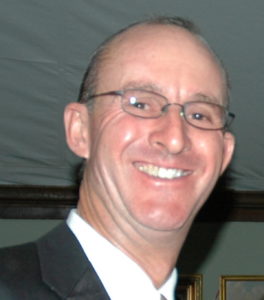
Geoff Teall (Photo by Nancy Jaffer)
“If everyone stays calm and gives this some thought, we can make everybody happier and spread it around and make life easier and less expensive,” he said.
It likely will also cut down on the numbers for the Maclay. For the first year, no one has to qualify for the 3-3, but in the future, Mason said, they can go in the Maclay regionals and then choose which final they want to participate in. Those who ride in the 3-3 cannot have completed in the 3-6 Maclay, the Washington championship, the USEF Talent Search, the USEF Medal or the Canadian Equestrian Team Medal.
Geoff believes the class will be popular.
“I think you’ll see a lot of people that back down a little bit,” said Geoff, meaning with the alternative of the 3-3 class, they may be more likely to skip the 3-6 if they’re not really ready.
“The fact that it is National Horse Show and is going to be in that ring gives it enough cachet that people will willingly give up” the idea of competing at 3-6 if they’re not really prepared.
“For me, the important piece of it should be the National Horse Show 3-foot-3 Something Medal. I easily could live without the word Maclay,” Geoff said, but he deferred to Mason.
Francie Steinwedell Carvin (1977) observed, “I think it’s watering down the Maclay. I think it’s making the Maclay less important, rather than more important. I don’t understand why they have to call it the Maclay. Call it the National Horse Show Medal.”
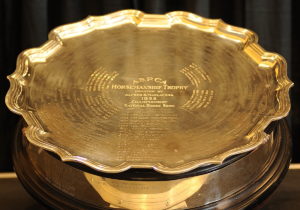
The ASPCA Maclay trophy. (Photo by Nancy Jaffer)
Katharine Burdsall Heller (1975) said the Maclay “was our special thing. It doesn’t seem right that they can take that away. I don’t see why they would need to do that.” She thinks the new class would be “popular enough” without the Maclay name.
Winning the Maclay, she commented, “made all the work worthwhile. It should stay its own entity.”



